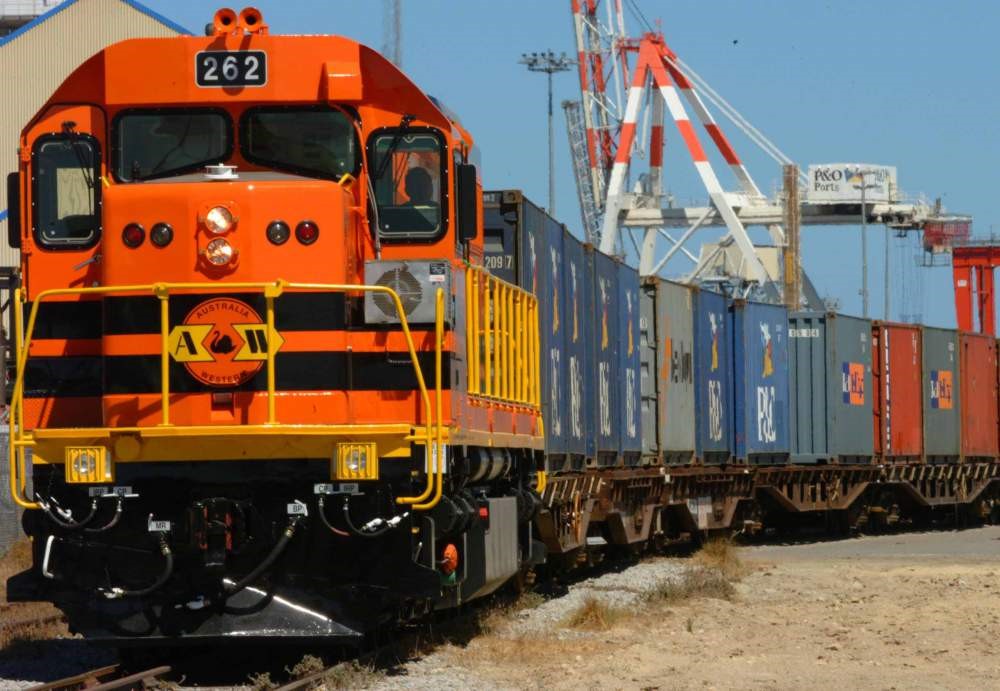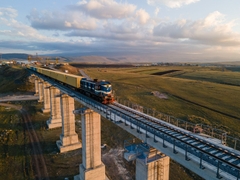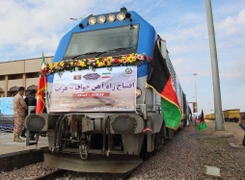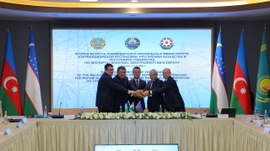Azerbaijan is expected to become a major cargo transportation hub within Eurasia, as several major infrastructure projects come online that form part of the International North-South Transport Corridor, including the Astara-Astara railway. On February 8, a pilot cargo train consisting of six 55-ton wagons and loaded with Russian timber left Azerbaijan and arrived in Iran via the route.
The new railway is short, measuring just 10 kilometers (6.2 miles) in length, but spans two Caspian countries, namely Iran and Azerbaijan, and links two cities with the same name. The line is expected to open in March. Eight kilometers (five miles) of tracks run through Azerbaijan, while the remaining two kilometers extend into Iran and end at its port city.
The Azerbaijan-Iran railroad is expected to form part of the International North-South Transport Corridor (INSTC), a 7,200 km (4,474 mi) multi-modal network of rail, road and sea routes that will move cargo throughout Europe and South and Central Asia.
Initiated by Russia, Iran and India the INSTC project aims to make transportation throughout the regions more competitive in terms of both transit time and cost, compared to alternative routes such as the Suez Canal sea route, which takes 40 days to transport goods. The INSTC looks to reduce this time to about 12 days.
“Azerbaijan has made major investments in these projects [the INSTC and East-West Transport Corridor], the President [Ilham Aliyev] demonstrated a serious political will and, most importantly, was able to preserve the interest of the states of the world in these projects,” said Natig Amirov, an assistant to the President Aliyev for economic policy and industrial issues, according to reporting by AzerNews.
INSTC is expected to move six million tons of freight through Azerbaijan annually in its early stages, and eventually reach a capacity between 15 and 20 million tons and expected to net the national exchequer several hundreds of millions of dollars in revenue.







 Azerbaijan, Uzbekistan, and Kazakhstan are planning to merge their energy systems following a historic memorandum of understanding (MoU) signed by ...
Azerbaijan, Uzbekistan, and Kazakhstan are planning to merge their energy systems following a historic memorandum of understanding (MoU) signed by ...
 The Azerbaijani government has rejected the recent claims made by French Interior Minister Gérard Darmanin, who accused Baku of fostering separatis...
The Azerbaijani government has rejected the recent claims made by French Interior Minister Gérard Darmanin, who accused Baku of fostering separatis...
 The Chief of the Atomic Energy Organisation of Iran (AEOI) said that the country has allowed more than 130 inspectors of the International Atomic E...
The Chief of the Atomic Energy Organisation of Iran (AEOI) said that the country has allowed more than 130 inspectors of the International Atomic E...
 Ulviyya Fataliyeva, a female Azerbaijani chess grandmaster, was crowned this week at the European Women’s Chess Championship (EWCC) in Rhodes, Gree...
Ulviyya Fataliyeva, a female Azerbaijani chess grandmaster, was crowned this week at the European Women’s Chess Championship (EWCC) in Rhodes, Gree...
 President Ilham Aliyev praised Azerbaijan’s cultural diversity as a key factor in fostering peace, stability, and unity within the country, where a...
President Ilham Aliyev praised Azerbaijan’s cultural diversity as a key factor in fostering peace, stability, and unity within the country, where a...



